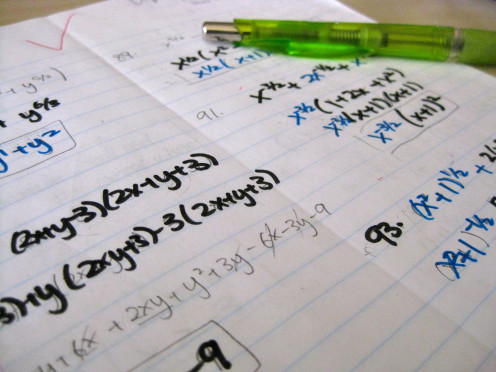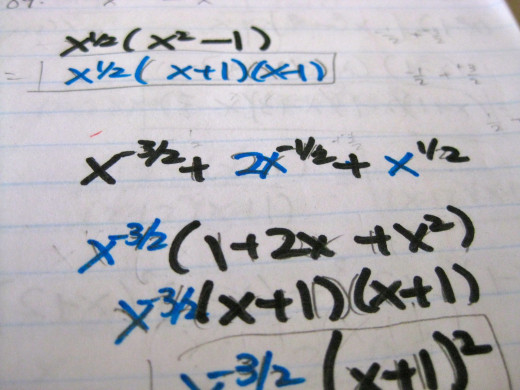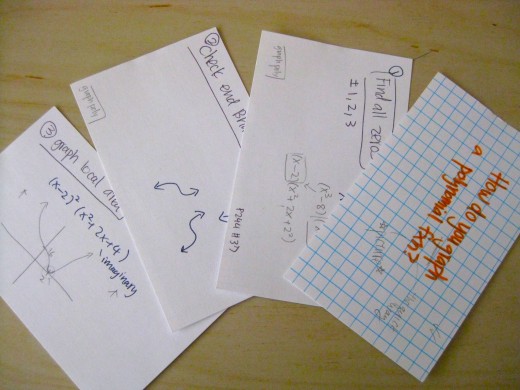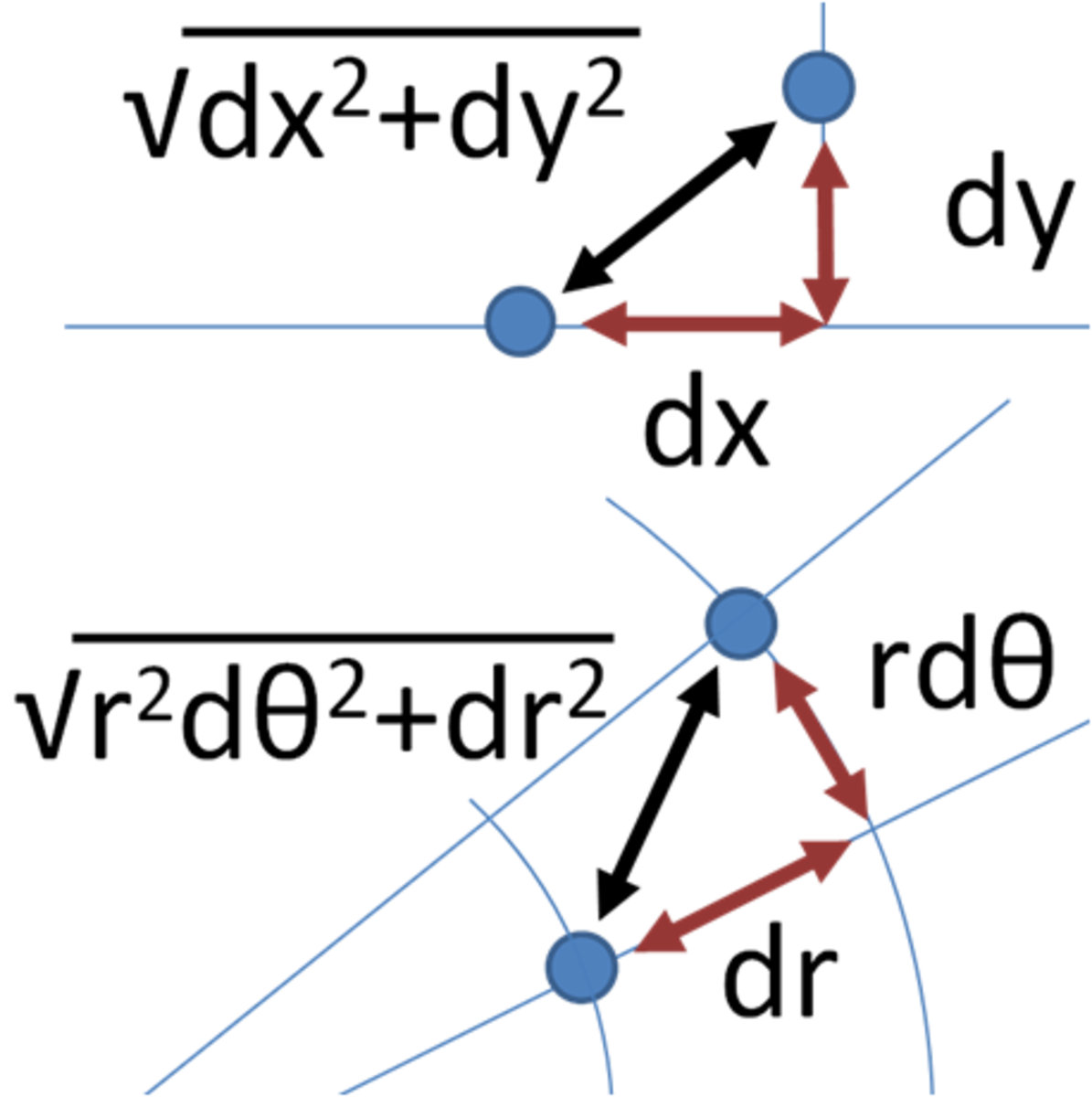How to study for a college math class

From my experience, studying for a college math or science course has been different from that of other subjects.My study habits that included procrastinating the reading of the required text or starting an assignment the night before its due date clearly did not help me in my comprehension regarding mathematical concepts and solving equations. There is probably no one correct way to study math, but if you are struggling or feel like your efforts are not being reflected in your work, these are some of the things that I learned that helped me achieve the results I wanted. Hopefully they can help you too.
What's your learning style?
Curious to know your unique study style? Find out by taking the quiz here
A Foolish Speculation
Before going over the study tips, I have a few assumptions about you, the student. I’m guessing that you have basic study skills down: you don't miss class, take good notes and complete the homework. But you feel as though there is more you can do to boost your grades up.
Before I get down to the nitty gritty tips, there are two important philosophies that make the following pointers work.
The first is know your learning style:
Realizing your particular learning style is useful because you can tailor how you study to how you learn best. Studying effectively, in the long run, would translate into spending time efficiently. There are three general learning styles: visual, auditory and kinesthetic. Howard Gardner’s multiple intelligence theory suggests that there could be up to seven learning styles! Whatever your individual study style, all of us are capable of adapting other forms of learning that will only enhance recalling information.
Another food for thought: Study in a way that you feel that you are ‘the best version of yourself’ and the grade will follow you.
So now..are you ready to learn the tips? Okay, lets go!


Doing Homework
The final grade in a college math class will be determined by the grades the student receives on exams (which come around every month) and the final exam. Completing the assigned homework is the first line of defense when it comes to succeeding on exams.
- Work on homework everyday (or at least try to): Math is a cumulative subject and information learned from the previous day builds on top of today's material. Having a solid understanding of yesterday’s topic will benefit your comprehension of new material.
- Complete all of the homework: Many college classes do not check or collect homework. It’s left to the student to figure out how much practice they need to master the material. (For some, that means tackling extra practice problems)
- Try homework with a timer: After taking a few college level math and science courses, I have come to realize that exams in these courses not only test what you know, but how fast you can recognize how to the solve the problem. Otherwise a situation might arise on the test where you could not complete the test because you ran out of time. In order to get used to solving questions under a time crunch, set 10 min on the clock and complete as many exercises as you can. Skip the ones you don’t know how to solve and review them after time is up. This builds a habit of working out problems faster.
- Try not to look at notes while doing homework: This shows what areas you’re strong in, and it brings forth the areas that need more attention. As with completing homework with a timer, go through the assignment once before returning to the questions that were troublesome.
- Get a notebook for homework: If classes do not collect assignments, consider buying a notebook specifically for homework to stay organized.
- Study with a buddy: Not just for homework checking but make a point to stay friendly with as many classmates as you can. Trust me, come midterm season, your emotional and mental sanity will thank you!

Reviewing
A difference in instruction between high school and university is that at university, students may be in class for half the time that they were in high school but cover twice the material1. With so much more information being covered in a short span of time, students may find themselves brushing up on their notes more frequently than they did in high school. For an average class, it's not unusual to spend three hours outside studying for every hour in class. Challenging courses can take more2. It is awesome if you have no issue memorizing loads of material, but for the rest of us, being able to bridge various concepts together would make studying more effective.
- Make a review sheet after completing homework: A nice way to summarize is to make a ‘cheat sheet’ that lists formulas or steps on how to solve a particular type of problem that you encountered on today’s assignment. This sheet comes in handy when preparing for any weekly quizzes assigned in class.
- Do a weekly review: The weekly review is the time to summarize and really solidify the information covered within that week inside thy brain. It’s the time to study how the various concepts are related to each other and get as much exposure as possible by trying out problems that were not assigned as part of homework. During this period also remember to brush up on the topics from previous weeks since the last test up til now. This way, when test time comes, you could spend your time practicing problems rather than recalling old material.
- Revise notes the same day you took them:According to the Ebbinghaus forgetting curve, within 30 minutes of learning new information you will only remember 75 percent of it. Within an hour this number drops to 50 percent, and in one day, hear this, you remember maybe 25 percent of the total information3. No wonder books on studying suggest to go over your notes as soon as you can! Revising notes right after class not only helps to fill any gaps in your notes, it’s taking an active step toward putting facts in your long term4 memory.
- Consider getting a practice study guide or another textbook: To get a hold of those extra study problemas.
- In the back of your mind: always be thinking of studying for the next test.
- Watch videos or look up websites online to clarify any concepts that remain troublesome.
One of my favorite "teachers" online, patrickjmt

Notecards
College education emphasizes that we gain an ability to apply our knowledge of the subject to answer new questions but somethings in math just have to be memorized. Many students use flashcards as a tool to help them remember important concepts. Note cards can be especially helpful when trying to master the steps on how to solve a particular type of problem. Write out each step to solving that question on a different note card. If you are a visual learner, you can even draw a picture next to the text to help recall. Tactile-kinesthetic learners can touch the cards and auditory learners can hear themselves read the steps out loud. They say we remember 90 percent of what we say and do. No wonder flashcards help us learn so well!

Test Anxiety
Many people feel some tension when going to take an exam. But for others, the stress is so powerful that they have a a dreadful feeling before entering the classroom. Or blank out during the test. Maybe even waking up during the middle of the night.
But fear no more! There are ways to fight off that nervousness.
- Be prepared: For students prone to anxiety, feeling like they have not prepared adequately sets them up to feel more anxious than they would have if they did have enough time to study.
- Visualize: Once the test is announced, not only prepare for the exam by going over the text, but prepare yourself emotionally. Imagine doing well on the test (and think about what you will do after it’s over).
- Come early: Running into the classroom a few minutes before tests are passed out takes away the time to relax and settle down before the big performance.
- Listen to music: I used to have a classmate who would always have her headphones on before any exam and I wondered why she would not spend her last minutes going over notes. I think I know why! Last minute cramming can be too stressful. Instead, listen to music or read something funny before the test, something that will help you relax.
How to deal with exam nerves
Reviewing for the test
Regular reviewing daily and weekly up until the week before the test allows you to not have to to cram much into the few days before the test. These tips below are some extra pointers for test specific preparation.
- Go over any quizzes and practice exams: This is the best tool in figuring out which concepts your professors find the most important and will likely test you on.
- Make and take your own practice exam: The more practice the better. Taking a timed practice exam is especially useful for students who tend to get test anxiety. Like a singer preparing for an audition, the rehearsal is not just a run through for the technical singing aspect but getting comfortable with any emotional jitters that may arise.
- Give it a week to study for exams: This can be adjusted depending on how comfortable you feel with the subject.
- Make your own study guide: Write down the chapter, topics covered in that chapter and problems that you feel that need more practice which are related to those topics listed (I like to write down homework problems I had trouble with).
- The day before the test—focus on what you know: Math exams work similar to the game Jeopardy: the players don't have to get all the questions right to win, they just have to answer the questions that will get them the most money, which are the ones they absolutely know the answer to. When studying the day before the test, focus on the material you feel most comfortable with because that will be the area that will win you the points on the test .
- Have a game plan: Of which types of problems you plan to solve first on the test.
On the day of the test
- Do a “memory dump”: Before starting the test, flip the test over and write down any formulas or steps to solving a problem that you might forget. Now there is a mini cheat sheet on the back of your test.
- Make an outline of which problems you'll solve in what order: This will save you time because you already anticipate which questions to complete first as you look through the test. This is the game plan I talked about earlier. *Wink wink*
- Look through the test twice: First, look through the test to see how many questions it covers. The second time around, mark up which group of problems you will solve first, second and last.
- If you get nervous: Sing (but not out loud!) stretch or take a deep breath, do anything that will get you back to focus instead of the anxiety taking control of you (My friend told me she sniffs her hair to calm down).
- Solve from the most comfortable problems: The easiest question might not be the ones on the first page. Carry on the test in the order that feels most comfortable to you.
- Skip the problems that you don't know: If you continue to doubt the answer, abandon the problem and focus on getting right the questions you feel confident in. Remember: it’s like Jeopardy.
- Don’t rush,stay calm: One minute spent on relaxing will not take away precious time.
- Have a schedule during the test: Such as “I’ll finish 10 problems by 9:30 (time)."
- Check answers: It’s easy to forget to check answers as you pace yourself and nothing hurts more than missing a question due to a careless mistake. Make sure to double check answers while going through the test or afterwards once you have finished early.
Well, that’s it folks! I hope these pointers were enlightening. Math can be a tough subject, but mastery will come with time and practice. If you have any other tips or comments, feel free to list them below. I wish you guys the best.

How to study for a college math class by StellaSee is licensed under a Creative Commons Attribution-NonCommercial-NoDerivs 3.0 Unported License.









